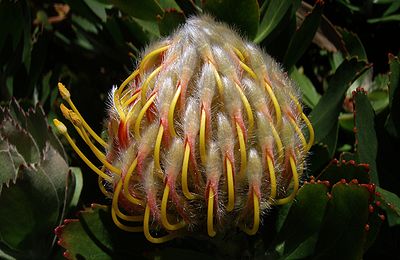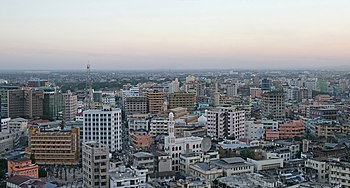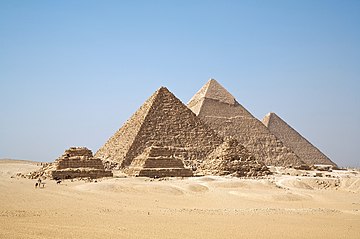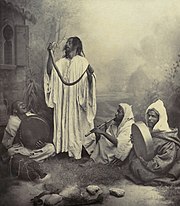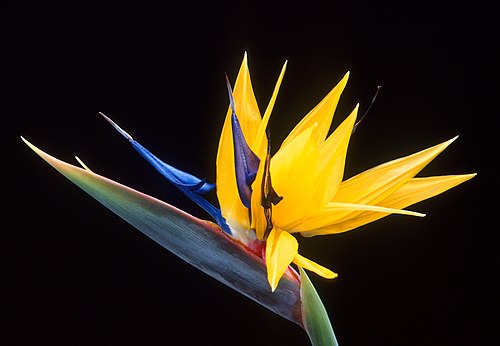Portal:Africa



Africa is the world's second largest and second-most populous continent after Asia. At about 30.3 million km2 (11.7 million square miles) including adjacent islands, it covers 20% of Earth's land area and 6% of its total surface area. With 1.4 billion people0 as of 2021, it accounts for about 18% of the world's human population. Africa's population is the youngest amongst all the continents; the median age in 2012 was 19.7, when the worldwide median age was 30.4. Despite a wide range of natural resources, Africa is the least wealthy continent per capita and second-least wealthy by total wealth, ahead of Oceania. Scholars have attributed this to different factors including geography, climate, corruption, colonialism, the Cold War, and neocolonialism. Despite this low concentration of wealth, recent economic expansion and the large and young population make Africa an important economic market in the broader global context. Africa has a large quantity of natural resources, including diamonds, sugar, salt, gold, iron, cobalt, uranium, copper, bauxite, silver, petroleum, natural gas and cocoa beans, as well as tropical fruit.
Africa straddles the equator and the prime meridian. It is the only continent to stretch from the northern temperate to the southern temperate zones. The majority of the continent and its countries are in the Northern Hemisphere, with a substantial portion and a number of countries in the Southern Hemisphere. Most of the continent lies in the tropics, except for a large part of Western Sahara, Algeria, Libya and Egypt, the northern tip of Mauritania, and the entire territories of Morocco, Ceuta, Melilla, and Tunisia which in turn are located above the tropic of Cancer, in the northern temperate zone. In the other extreme of the continent, southern Namibia, southern Botswana, great parts of South Africa, the entire territories of Lesotho and Eswatini and the southern tips of Mozambique and Madagascar are located below the tropic of Capricorn, in the southern temperate zone.
Africa is highly biodiverse; it is the continent with the largest number of megafauna species, as it was least affected by the extinction of the Pleistocene megafauna. However, Africa also is heavily affected by a wide range of environmental issues, including desertification, deforestation, water scarcity and pollution. These entrenched environmental concerns are expected to worsen as climate change impacts Africa. The UN Intergovernmental Panel on Climate Change has identified Africa as the continent most vulnerable to climate change.
The history of Africa is long, complex, and varied, and has often been under-appreciated by the global historical community. Africa, particularly Eastern Africa, is widely accepted as the place of origin of humans and the Hominidae clade (great apes). The earliest hominids and their ancestors have been dated to around 7 million years ago, including Sahelanthropus tchadensis, Australopithecus africanus, A. afarensis, Homo erectus, H. habilis and H. ergaster—the earliest Homo sapiens (modern human) remains, found in Ethiopia, South Africa, and Morocco, date to circa 233,000, 259,000, and 300,000 years ago, respectively, and Homo sapiens is believed to have originated in Africa around 350,000–260,000 years ago. Africa is also considered by anthropologists to be the most genetically diverse continent as a result of being the longest inhabited. (Full article...)
Selected article –
The Zanzibar Revolution (Swahili: Mapinduzi ya Zanzibar; Arabic: ثورة زنجبار, romanized: Thawrat Zanjibār) began on 12 January 1964 and led to the overthrow of the Sultan of Zanzibar Jamshid bin Abdullah and his mainly Arab government by the island's majority Black African population.
Zanzibar was an ethnically diverse state consisting of a number of islands off the east coast of Tanganyika. It had become fully independent in 1963, with responsibility for its own defense and foreign affairs, as a result of Britain giving up its protectorate over it. In a series of parliamentary elections preceding this change, the Arab minority succeeded in retaining the hold on power it had inherited from Zanzibar's former existence as an overseas territory of Oman. (Full article...)Featured pictures –
Did you know (auto-generated) -

- ... that Magawa, an African giant pouched rat, sniffed out more than 70 land mines in Cambodia?
- ... that land for a library built for African Americans in Virginia was donated by Pope Pius XII?
- ... that one of the first activities of The Coloured Women's Club of Montreal was to help veterans returning from the Second Boer War in South Africa?
- ... that the Enterprise, a black newspaper in Omaha, supported a separate African American department at the 1898 Trans-Mississippi Exposition?
- ... that Dominion: An Anthology of Speculative Fiction From Africa and the African Diaspora was partly inspired by The 1619 Project?
- ... that Albert Luthuli was the first African to win the Nobel Peace Prize?
Categories
Selected biography –
Okot p'Bitek (7 June 1931 – 19 July 1982) was a Ugandan poet, who achieved wide international recognition for Song of Lawino, a long poem dealing with the tribulations of a rural African wife whose husband has taken up urban life and wishes everything to be westernised. Song of Lawino was originally written in the Acholi dialect of Southern Luo, translated by the author into English, and published in 1966. It was a breakthrough work, creating an audience among anglophone Africans for direct, topical poetry in English; and incorporating traditional attitudes and thinking in an accessible yet faithful literary vehicle. It was followed by the Song of Ocol (1970), the husband's reply.
The "East African Song School" or "Okot School poetry" is now an academic identification of the work following his direction, also popularly called "comic singing": a forceful type of dramatic verse monologue rooted in traditional song and phraseology. (Full article...)Selected country –
 |
 |
||
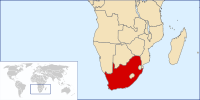
| |||
South Africa, officially the Republic of South Africa, is a country located at the southern tip of the African continent. It borders Namibia, Botswana, Zimbabwe, Mozambique, Swaziland, and Lesotho. South Africa is often called the "Rainbow Nation", a term coined by Archbishop Desmond Tutu and later adopted by then President Nelson Mandela.
South Africa is an ethnically diverse nation with the largest white, Indian, and racially-mixed communities in Africa. Black South Africans, who speak nine officially-recognized languages and many more dialects, account for slightly less than 80% of the population. Racial strife between the white minority and the black majority has played a large part in the country's history and politics, culminating in apartheid, which was instituted in 1948 by the National Party (although segregation existed prior to then). The laws that defined apartheid began to be repealed or abolished by the National Party in 1990 after a long and sometimes violent struggle. (Read more...)
Selected city –

Giza (/ˈɡiːzə/; sometimes spelled Gizah, Gizeh, Geeza, Jiza; Arabic: الجيزة, romanized: al-Jīzah, pronounced [aljiːzah], Egyptian Arabic: الجيزة el-Gīza [elˈgiːzæ]) is the third-largest city in Egypt by area after Cairo and Alexandria; and fourth-largest city in Africa by population after Kinshasa, Lagos, and Cairo. It is the capital of Giza Governorate with a total population of 4,872,448 in the 2017 census. It is located on the west bank of the Nile opposite central Cairo, and is a part of the Greater Cairo metropolis. Giza lies less than 30 km (18.64 mi) north of Memphis (Men-nefer, today the village of Mit Rahina), which was the capital city of the unified Egyptian state during the reign of pharaoh Narmer, roughly 3100 BC.
Giza is most famous as the location of the Giza Plateau, the site of some of the most impressive ancient monuments in the world, including a complex of ancient Egyptian royal mortuary and sacred structures, among which are the Great Sphinx, the Great Pyramid of Giza, and a number of other large pyramids and temples. Giza has always been a focal point in Egypt's history due to its location close to Memphis, the ancient pharaonic capital of the Old Kingdom. (Full article...)In the news
- 12 February 2024 –
- Two boats collide on the Congo River near Kinshasa, Democratic Republic of the Congo; with the death toll remains unclear. (AP)
- 11 February 2024 – 2023 Africa Cup of Nations
- In association football, hosts Ivory Coast win their third Africa Cup of Nations by defeating Nigeria 2–1 in the final. Sébastien Haller scores the winning goal in the 81st minute. (The Guardian)
- 10 February 2024 – Somali civil war
- Four Emirati soldiers and a Bahraini military officer are killed, while ten other people are injured, when a soldier opens fire at a military base in Mogadishu, Somalia, before being killed in the ensuing shootout. Al-Shabaab claims responsibility. (AP)
- 10 February 2024 –
- A Eurocopter EC130 helicopter crashes near Nipton, California, United States, killing all the six people on board, including Nigerian banker Herbert Wigwe. (CBS News)
- 10 February 2024 – 2023–2024 Senegalese protests
- Violent protests occur in Senegal following an announcement by President Macky Sall that presidential elections have been delayed from February 25 to December 15. (Sky News)
- 9 February 2024 –
- At least 18 people are killed during a collision between a bus and a truck on a road in Kinshasa, Democratic Republic of the Congo. (AP)
Updated: 16:33, 14 February 2024
General images -
Africa topics
More did you know –
- ... that at approximately 5,000 years old, the Lothagam North Pillar Site is thought to be the earliest and largest monumental cemetery in eastern Africa?
- ... that a 2020 study found that African countries which allowed foreign funding of NGOs had a higher voter turnout?
- ... that Essop Moosa, who was of Indian origin, became the first non-white player to play for an all-white soccer team in South Africa, appearing under a pseudonym?
- ... that the Seventh German Inner Africa Research Expedition served as cover for a secret First World War espionage mission?
Related portals
Major Religions in Africa
North Africa
West Africa
Central Africa
East Africa
Southern Africa
Associated Wikimedia
The following Wikimedia Foundation sister projects provide more on this subject:
-
Commons
Free media repository -
Wikibooks
Free textbooks and manuals -
Wikidata
Free knowledge base -
Wikinews
Free-content news -
Wikiquote
Collection of quotations -
Wikisource
Free-content library -
Wikispecies
Directory of species -
Wikiversity
Free learning tools -
Wikivoyage
Free travel guide -
Wiktionary
Dictionary and thesaurus





